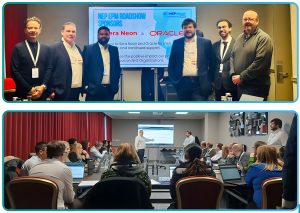Delivering Oracle Cloud programmes that work in the real world.
At Sera Neon we deliver implementation programmes for Oracle ERP, EPM and HCM solutions that go beyond the technical build. We align systems, processes and people so your organisation realises real-world benefits. From initial planning and build through to go-live and hypercare, our focus remains on predictable delivery, reduced disruption and sustainable value.
Benefits of Implementation Services
We build practical, low-risk EPM, ERP and HCM implementations that put reporting, process and people first. Whether you are moving to Oracle Cloud for the first time or improving an existing estate, our focus is on predictable delivery and lasting adoption.
Outcomes first
Clear business objectives and reporting that supports decision making.
People and adoption
Role-based training and change support so the solution is used the way it was intended.
Sustainable operations
We share with you a maintainable platform, internal skills and a roadmap for future growth.
Practical configuration
Pragmatic builds that reduce custom code and speed go live.
Improved efficiency
Reduce post-go-live disruption with well-prepared teams.
Business-first configuration
We prioritise process design and business logic before tailoring the system.
What we deliver
We tailor every implementation to your needs, but typical deliverables include:
Fit-gap and requirements analysis
Blueprint and solution design for EPM / ERP / HCM
Pre-packaged EPM frameworks where appropriate to accelerate delivery
Reporting strategy, report development and testable report packs
Data migration and reconciliation scripts
Integration design and interface testing
End-to-end testing plans and execution (integration, system, UAT)
Role-based training materials, train-the-trainer and go-live support
Hypercare and transition to managed services
Our approach for EPM: clear phases, predictable timescales
We follow a phased approach so stakeholders know exactly what to expect and when. Below is the programme structure we typically use for EPM implementations. Timings should be treated as a guide and adapted to the size and complexity of each project.
Phase 1: Consolidation & close setup (0–6 months)
This stage lays the groundwork for everything that follows. We stabilise existing close processes, review the current chart of accounts and reporting hierarchies, and prepare the organisation for consistent consolidation cycles.
Key activities include mapping entities, intercompany eliminations, and identifying early opportunities for automation.
By the end of this phase, financial data flows are standardised, controls are visible, and the business gains its first view of how Oracle EPM will improve governance and accuracy.
Phase 2: Planning & forecasting (4–10 months)
Once the foundation is solid, focus shifts to forward-looking performance.
We design driver-based planning models that connect financial and operational plans, giving management a clearer view of revenue, cost, and cash flow scenarios.
This phase also introduces forecasting automation, workflow approvals, and variance reporting all configured to reflect your business logic, not a generic template.
By the end, the organisation can plan with confidence and adjust forecasts in days rather than weeks.
Phase 3: Disclosure & XBRL automation (8–12 months)
Regulatory and management reporting must be accurate, repeatable, and traceable.
Here, we automate statutory disclosures, narrative reports, and XBRL submissions, reducing manual intervention and audit risks.
Data lineage and consistency checks are built into the process, ensuring every figure reported can be traced back to source data.
This phase delivers time savings during quarter-end and year-end while strengthening control and compliance frameworks.
Phase 4: ESG reporting integration (10–18 months)
Sustainability reporting is no longer optional. We help clients integrate ESG metrics into their EPM environment linking non-financial KPIs such as emissions, diversity, and governance indicators with financial outcomes.
This ensures ESG data benefits from the same governance, validation, and auditability as traditional financial reporting.
The outcome is a unified reporting model that reflects the complete picture of organisational performance.
Phase 5: Extended planning & analytics (xP&A) (12–18 months)
By this stage, planning maturity grows beyond finance. We extend Oracle Cloud’s capabilities to operational teams such as supply chain, workforce, and sales planning.
This integrated model allows business units to collaborate on a single version of the truth, with consistent assumptions and shared data.
The organisation moves from static budgeting to continuous, rolling forecasts and scenario-based decision support.
Phase 6: AI-driven insights (15–24 months)
Once reliable data and processes are established, artificial intelligence and predictive analytics can safely add value.
We introduce machine learning–based forecasting, anomaly detection, and automated commentary to improve insight and efficiency.
This phase is entirely driven by readiness we only deploy AI when data quality, user adoption, and governance are strong enough to sustain it.
The result is an intelligent, self-improving reporting ecosystem that supports strategic decision-making.
Bringing It All Together
Across all six phases, our delivery model is guided by:
- Transparency: Clearly defined milestones and stakeholder updates at every step.
- Business Alignment: IT and Finance work together from design to adoption.
- Adaptability: Timelines flex to accommodate organisational capacity, not the other way round.
- Sustainability: Every deliverable is designed for long-term maintainability within your internal teams.
Our Expertise in Training and Change
Our change and training consultants bring a mix of Oracle expertise and hands-on delivery experience to every engagement.
- At Affinity Water, we provided short-notice, focused PPM training before their Oracle go-live, ensuring project teams could confidently navigate the system from day one.
- For Heriot-Watt University, we developed a tailored programme of training and user support during their multi-year Oracle journey, maintaining consistent user engagement across multiple phases of transformation.
- With Barnet Council, we advised on adoption strategies and provided practical support materials that helped embed new processes across departments during their Oracle Cloud stabilisation phase.
By aligning training with real-world processes and combining it with effective change management, we ensure your teams are ready to succeed with Oracle Cloud today and adapt confidently as your environment evolves.
Why Choose
Sera Neon
Empower. Deliver. Embed.
Sera Neon specialises in delivering Oracle Cloud implementations that actually work for your business. We combine pragmatic delivery methods, deep Oracle knowledge and people-focused change activities so your programme finishes on time, stays on budget and becomes part of everyday working.
Practical delivery experience
Hands-on delivery across ERP, EPM and HCM ensures practical solutions that work in live environments.
Business-first approach
We design around process and reporting needs so the system supports decisions, not just transactions.
End-to-end support
From mobilisation and data migration to go-live and hypercare, we provide consistent technical and change support.
Proven delivery methodology
A phased, repeatable approach reduces rework and keeps stakeholders aligned throughout the programme.
Sustainable adoption
Role-based training and handover materials mean your teams can operate and evolve the platform independently.
Our Blogs

NEP EPM Roadshow Brings NHS Finance Colleagues Together for Insight-Driven Planning
NEP EPM Roadshow Brings NHS Finance Colleagues Together for Insight-Driven Planning

Oracle Cloud Programme Assurance & Test Management for a Major UK Utilities Group
Sera Neon acted as the strategic testing and assurance partner for a major UK utilities group during its Oracle Cloud transformation, delivering end-to-end test governance, independent SI assurance, and go-live readiness across HCM, Finance, Integrations, and Data Migration.

Oracle Fusion Financials Strategic Review, Remediation & Optimisation
Sera Neon delivered a comprehensive Oracle Fusion strategic review and optimisation programme for a major UK public sector organisation, transforming a complex, manually intensive finance platform into a more resilient, automated, and future-ready digital foundation.
